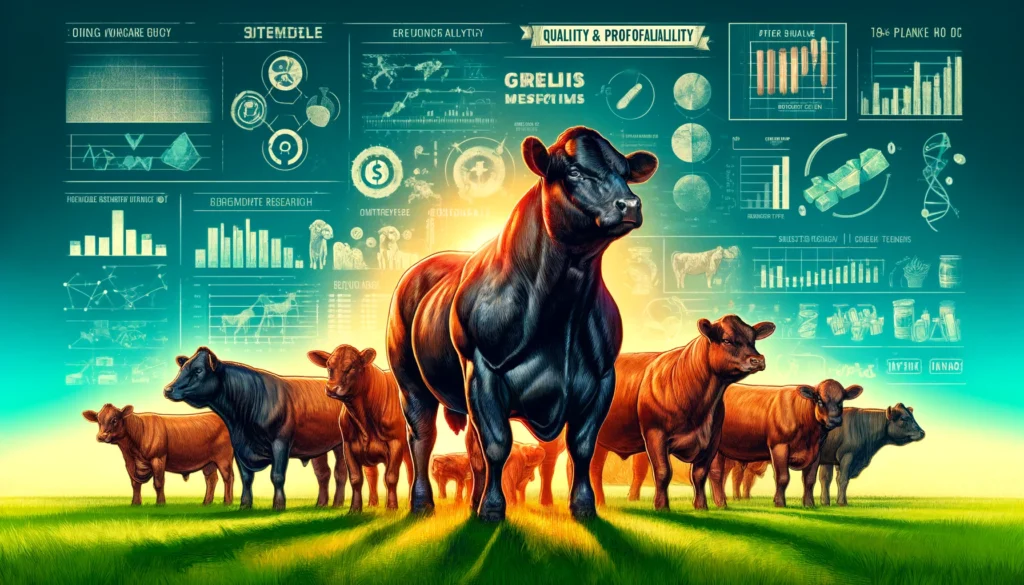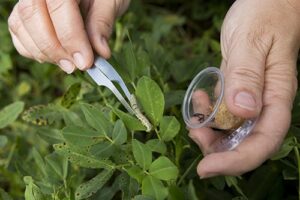
Angus Cattle Genetics A vivid and detailed illustration showcasing Angus cattle genetics for quality and profitability. Depict a herd of Angus cattle in a lush green pastu4.webp.webp
Enhancing Angus Cattle Genetics for Superior Performance and Profitability
Introduction
Enhancing Angus cattle genetics is essential for breeders aiming to improve herd quality and increase profitability. By focusing on genetic selection and advanced breeding techniques, farmers can achieve superior meat quality, better growth rates, and overall improved herd health. This comprehensive guide explores the principles of Angus genetics, effective strategies for genetic improvement, and practical applications to enhance herd quality and profitability.
Importance of Angus Cattle Genetics
Meat Quality
Angus cattle are renowned for their exceptional meat quality, particularly their marbling, which enhances the tenderness, juiciness, and flavor of the meat. Marbling refers to the intramuscular fat within the meat, which melts during cooking and contributes to a rich, buttery texture.
Fall off the barn roof and busted your keister? Life on the farm or ranch can be tough on the bum. Need a break? Laugh it off at FarmerCowboy.com, the #1 farm humor site. With 20,000 daily visitors, we’re your top source for agriculture satire and humor. Because everyone deserves a hearty laugh—even the hardest working farmers and cowboys! Join us and turn those long days into fun tales at FarmerCowboy.com.
Consistent genetic selection is crucial to maintaining high meat quality across the herd. Breeding programs that focus on marbling and other quality traits ensure that consumers receive the premium beef they expect from the Angus brand. This consistency helps build brand loyalty and meet market demands【https://actuallyawful.com/mastering-angus-cattle-genetics-for-quality/】.
Growth and Efficiency
Feed efficiency is another critical aspect of Angus genetics. Genetic improvements can lead to better feed conversion rates, reducing feed costs and increasing profitability. Selecting for traits that enhance feed efficiency ensures that cattle grow more rapidly and reach market weight more quickly, optimizing production cycles.
Rapid growth traits not only improve production efficiency but also enhance profitability. Cattle that reach market weight faster reduce the overall cost of production, allowing farmers to achieve higher returns on their investment【https://actuallyawful.com/optimizing-angus-cattle-genetics/】.
Fertility and Reproduction
Fertility and reproductive efficiency are vital components of successful cattle breeding. Genetics play a crucial role in reducing calving difficulties, improving cow and calf survival rates, and enhancing overall reproductive performance. Selecting for traits that improve calving ease and conception rates can lead to more consistent and successful breeding outcomes.
Enhanced genetic traits can lead to higher conception rates, shorter calving intervals, and increased herd productivity. This improvement in reproductive efficiency ensures that the herd maintains a steady supply of calves, supporting long-term profitability and sustainability【https://actuallyawful.com/maximizing-angus-genetics/】.
Disease Resistance
Health and longevity are essential for maintaining a productive and profitable herd. Genetic selection for disease resistance and overall health reduces veterinary costs and enhances the longevity and productivity of the herd. Implementing robust health management practices supports genetic improvements in disease resistance, ensuring that the herd remains healthy and productive.
Selecting for traits that confer disease resistance helps reduce the incidence of common cattle diseases, minimizing the need for medical interventions and promoting overall herd health. This approach not only reduces costs but also improves animal welfare【https://actuallyawful.com/elevating-angus-cattle-genetics/】.
Strategies for Genetic Improvement
Selective Breeding
Selective breeding is the cornerstone of genetic improvement in Angus cattle. By keeping detailed records of performance traits such as weight gain, feed efficiency, and reproductive success, breeders can identify superior breeding stock. Utilizing genetic evaluation tools and databases to assess the genetic merit of animals is essential for making informed breeding decisions.
Performance recording allows breeders to track the progress of their breeding programs and identify animals that excel in specific traits. This data-driven approach ensures that only the best animals are selected for breeding, improving the overall quality of the herd【https://farmercowboy.com/mastering-angus-cattle-genetics-for-quality-and-profitability/】.
Crossbreeding
Crossbreeding Angus cattle with other breeds can introduce desirable traits and enhance performance through hybrid vigor. Hybrid vigor, or heterosis, occurs when crossbred animals exhibit superior performance compared to their purebred counterparts. Carefully planning mating strategies to combine the best traits from different breeds can improve overall herd performance.
Crossbreeding programs must be carefully managed to maintain the desired traits of both parent breeds while maximizing the benefits of hybrid vigor. This approach can lead to significant improvements in growth rates, feed efficiency, and overall productivity【https://actuallyawful.com/advancing-angus-cattle-genetics/】.
Genomic Testing
Genomic testing provides insights into the genetic potential of cattle, allowing for more accurate selection and breeding decisions. DNA analysis can identify specific genetic markers associated with desirable traits, such as marbling, growth rates, and disease resistance. Using genetic markers to select animals with these traits can significantly enhance herd quality.
Genomic testing enables breeders to make more informed decisions about which animals to breed, reducing the reliance on phenotypic selection alone. This technology accelerates genetic progress by identifying superior animals earlier in their development【https://actuallyawful.com/mastering-angus-cattle-genetics-for-quality/】.
Artificial Insemination (AI) and Embryo Transfer (ET)
AI and ET enable breeders to introduce superior genetics from elite bulls and cows worldwide, enhancing genetic diversity and quality. These technologies allow for the rapid multiplication of desirable traits within the herd, accelerating genetic progress.
AI involves collecting semen from a genetically superior bull and artificially inseminating cows. ET involves fertilizing an egg from a superior cow and implanting the embryo into a surrogate cow. Both techniques allow breeders to quickly and efficiently spread desirable genetics throughout the herd【https://farmercowboy.com/mastering-angus-cattle-genetics-for-quality-and-profitability/】.
Practical Applications for Quality and Profitability
Herd Health Management
Effective herd health management is crucial for supporting genetic improvements and maintaining a productive herd. Implementing robust health management practices, such as vaccination programs and biosecurity measures, helps prevent disease and promote overall herd health.
Providing balanced nutrition tailored to the genetic needs of the herd maximizes growth and reproductive performance. Nutritional management should focus on providing essential nutrients that support optimal health and productivity【https://actuallyawful.com/optimizing-angus-cattle-genetics/】.
Data Management
Maintaining comprehensive records of genetic data, performance metrics, and health status is essential for informed breeding decisions. Utilizing software tools for data analysis and genetic evaluation streamlines decision-making processes and helps breeders track the progress of their breeding programs.
Effective data management allows breeders to identify trends and make adjustments to their breeding strategies as needed. This proactive approach ensures continuous improvement and maximizes the benefits of genetic advancements【https://actuallyawful.com/maximizing-angus-genetics/】.
Market Strategies
Leveraging the superior quality of Angus beef through branding and certification programs, such as Certified Angus Beef, helps achieve premium market prices. Educating consumers about the benefits of Angus genetics and the quality of the beef builds brand loyalty and demand.
Effective marketing strategies should highlight the unique qualities of Angus beef, such as its marbling, tenderness, and flavor. By promoting these attributes, breeders can differentiate their product and attract discerning consumers【https://actuallyawful.com/elevating-angus-cattle-genetics/】.
Case Studies
Improved Feed Efficiency
A study conducted on a herd implementing genomic selection for feed efficiency found a significant reduction in feed costs. The selected cattle demonstrated a 15% improvement in feed conversion ratios, translating to substantial savings and increased profitability.
Improving feed efficiency through genetic selection not only reduces costs but also supports sustainable farming practices. Efficient cattle require fewer resources, reducing the environmental impact of beef production【https://actuallyawful.com/advancing-angus-cattle-genetics/】.
Enhanced Meat Quality
A breeding program focused on marbling traits in Angus cattle resulted in a 20% increase in the proportion of cattle grading as Prime or Choice. This improvement allowed the farm to secure higher market prices and expand its customer base.
Enhanced meat quality through genetic selection ensures that consumers receive a premium product, supporting higher prices and improved profitability. Breeders who focus on meat quality can build a strong reputation for excellence in the market【https://farmercowboy.com/mastering-angus-cattle-genetics-for-quality-and-profitability/】.
Challenges and Solutions
Genetic Diversity
Maintaining genetic diversity while selecting for specific traits is a common challenge in cattle breeding. Overemphasis on certain traits can lead to a reduction in overall genetic diversity, increasing the risk of inbreeding and associated health problems.
Implementing rotational breeding strategies and incorporating new genetics through AI and ET can help maintain genetic diversity. By introducing fresh genetic material, breeders can reduce the risk of inbreeding and promote a healthy, resilient herd【https://actuallyawful.com/mastering-angus-cattle-genetics-for-quality/】.
Balancing Traits
Balancing multiple traits, such as growth rate and meat quality, without compromising overall performance can be challenging. Selecting for one trait may inadvertently affect others, making it essential to consider the overall genetic profile of the animals.
Using multi-trait selection indices to evaluate and select animals that excel in various traits simultaneously can help balance genetic improvement. This approach ensures that breeders do not compromise one trait for another, promoting overall herd quality【https://actuallyawful.com/optimizing-angus-cattle-genetics/】.
Conclusion
Enhancing Angus cattle genetics is a key factor in achieving superior herd performance and profitability. By understanding and applying genetic principles, breeders can enhance desirable traits, improve herd performance, and meet market demands. Implementing strategies such as selective breeding, crossbreeding, genomic testing, and advanced reproductive technologies can drive significant genetic improvements.
Ultimately, a well-managed genetic program leads to healthier, more productive cattle and increased profitability for breeders. With continuous advancements in genetic technology and breeding practices, the future of Angus cattle breeding looks promising【https://farmercowboy.com/mastering-angus-cattle-genetics-for-quality-and-profitability/】.
How Enhancing Angus Cattle Genetics Can Help Farmers
Enhancing Angus cattle genetics helps farmers by improving meat quality, enhancing feed efficiency, increasing reproductive success, and promoting disease resistance. These benefits lead to higher market prices, reduced costs, and greater overall profitability, contributing to sustainable and successful cattle farming operations.
Learn more about enhancing Angus cattle genetics to achieve better herd performance and profitability.
Discover effective strategies for enhancing Angus cattle genetics that can enhance your farming operations.
Explore practical applications of enhancing Angus cattle genetics to improve herd quality and sustainability.

Originally posted 2024-05-31 10:12:46.
Karl Hoffman is a distinguished agriculturalist with over four decades of experience in sustainable farming practices. He holds a Ph.D. in Agronomy from Cornell University and has made significant contributions as a professor at Iowa State University. Hoffman’s groundbreaking research on integrated pest management and soil health has revolutionized modern agriculture. As a respected farm journalist, his column “Field Notes with Karl Hoffman” and his blog “The Modern Farmer” provide insightful, practical advice to a global audience. Hoffman’s work with the USDA and the United Nations FAO has enhanced food security worldwide. His awards include the USDA’s Distinguished Service Award and the World Food Prize, reflecting his profound impact on agriculture and sustainability.



Why did the cow get a ticket? For moo-ving violations!